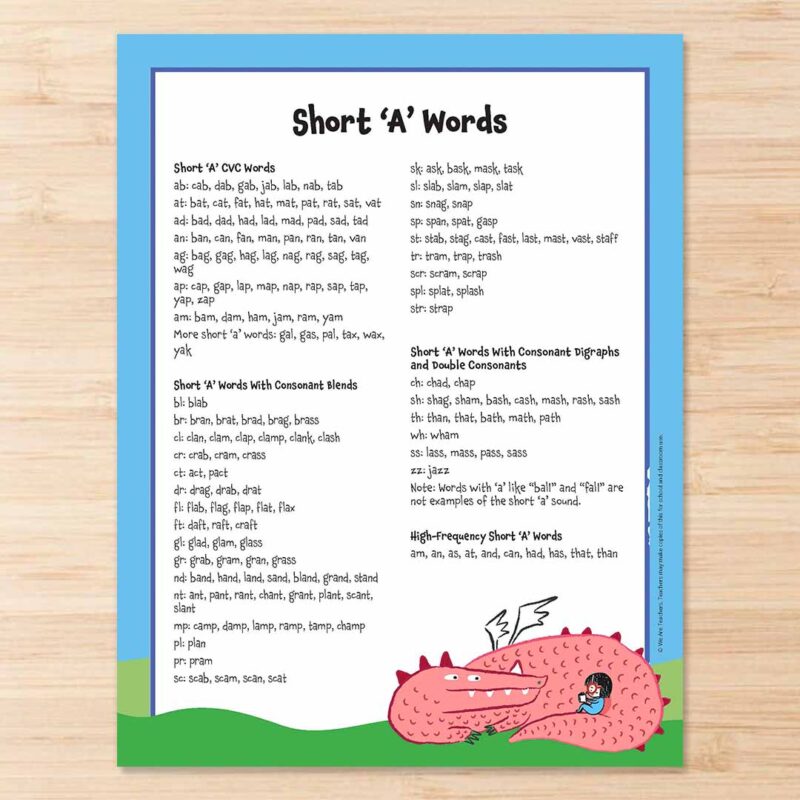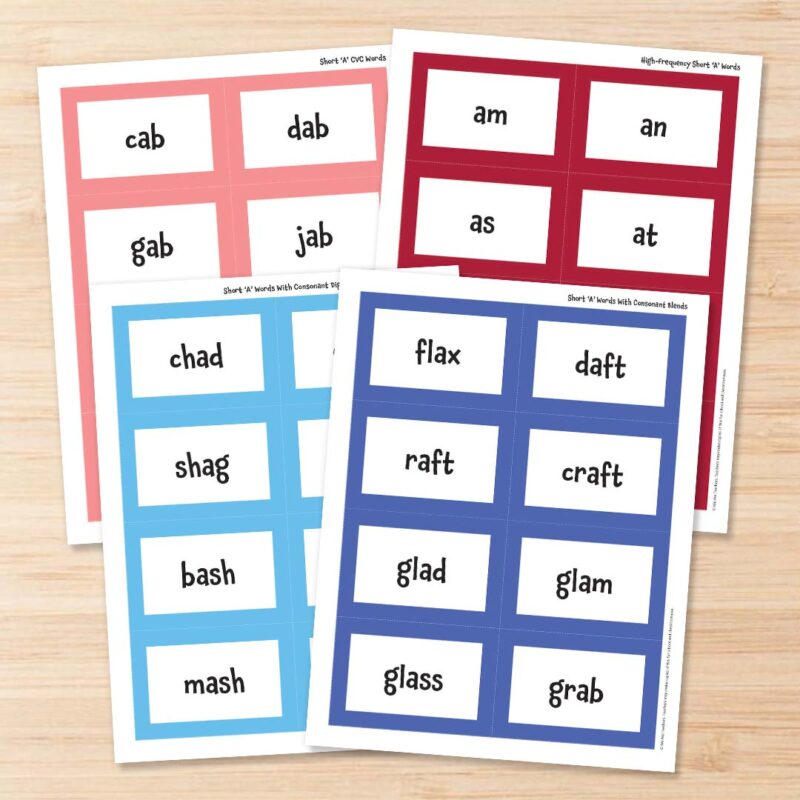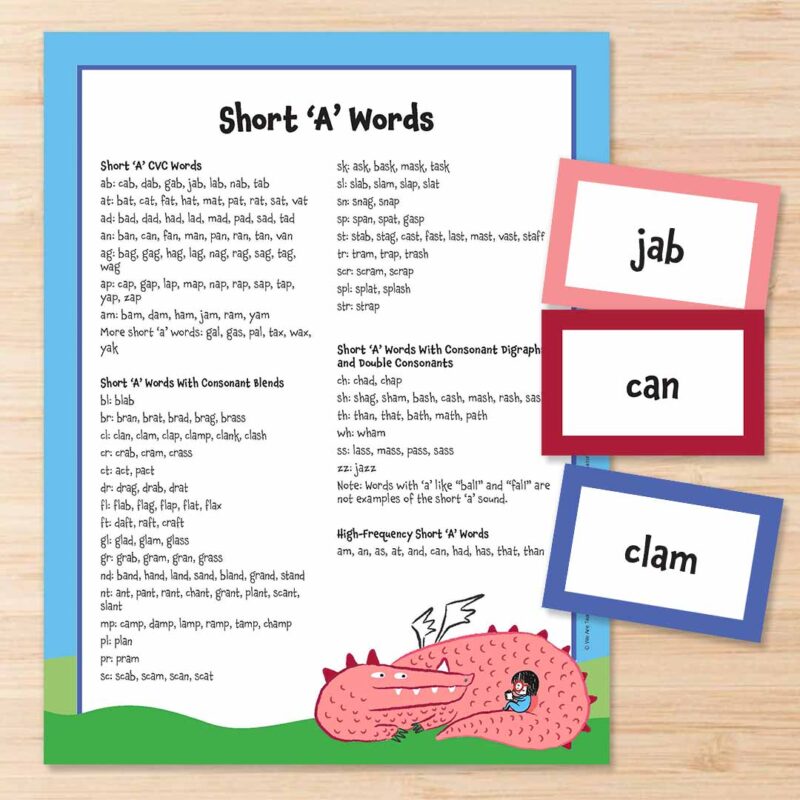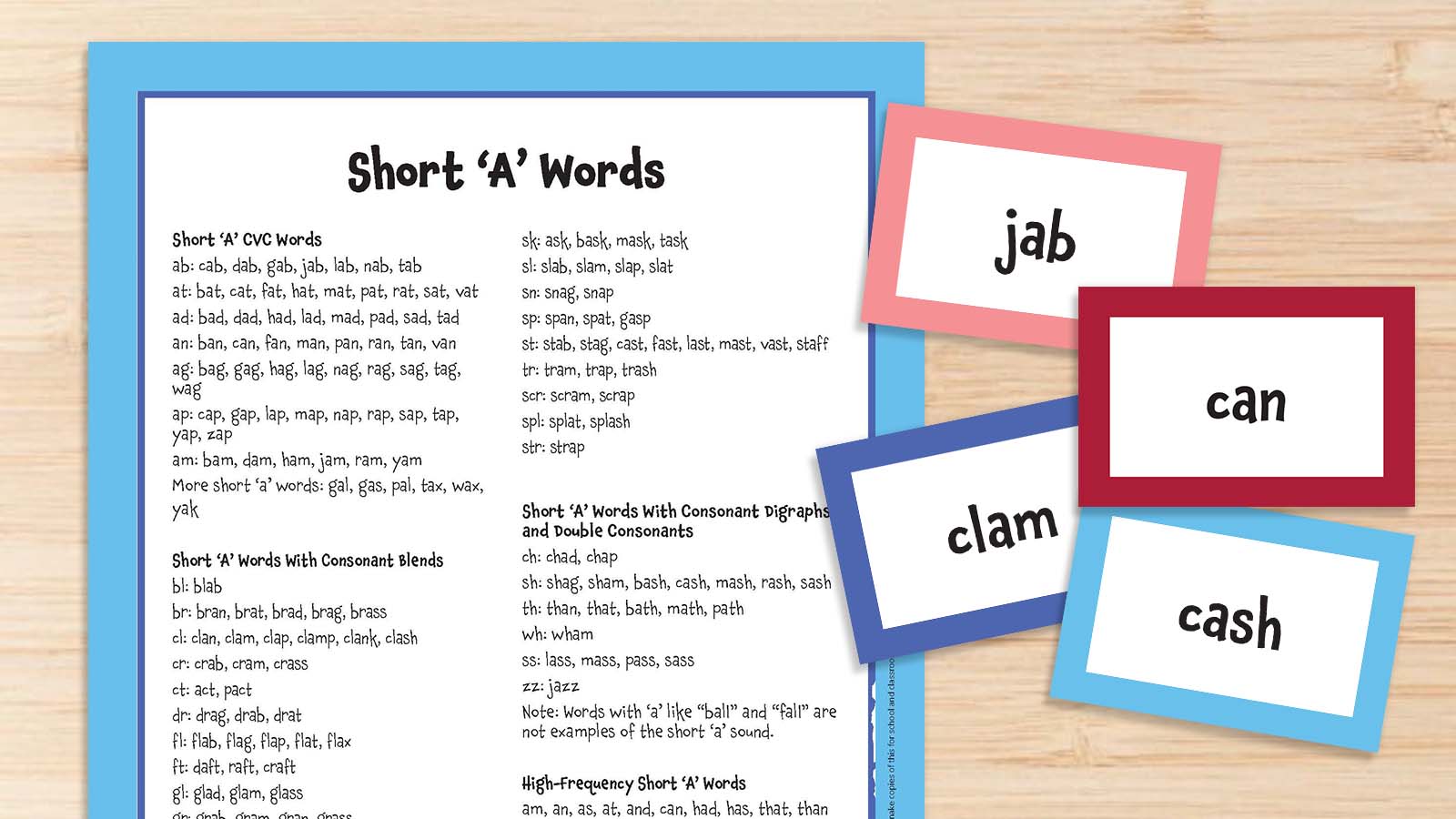Teaching short vowel sounds gives new readers the power to blend and read words right away. Short ‘a’ is a great place to start. You can move your way through the sections of this list as you teach students more consonant sounds and patterns. Remember to make sure students know what each word on the list means!
Plus, grab our free printable short ‘a’ word list and cards. Then try some of the activities below.
Jump to:
- Starter words for short ‘a’
- Short ‘a’ CVC words
- Short ‘a’ words with consonant digraphs and double consonants
- Short ‘a’ words with consonant blends
- High-frequency short ‘a’ words
- How to use the word list and cards
Starter Words for Short ‘A’
Using letter-sound knowledge to read and write words is exciting and motivating for young learners. There’s no reason to wait! There are lots of words that kids can read and write as soon as they know the short ‘a’ sound and a handful of key consonants. Introduce these words when students know the short ‘a’ sound and consonants m, s, p, and t:
at, am, Pam, Sam, map, sap, tap, mat, pat, sat
Short ‘A’ CVC Words

Kids can read and write short ‘a’ words that follow the consonant-vowel-consonant (CVC) pattern once they know the consonant sounds in each word. (For convenience, we’ve included the starter CVC words with short ‘a’ from above in this list too.)
ab: cab, dab, gab, jab, lab, nab, tab
at: bat, cat, fat, hat, mat, pat, rat, sat, vat
ad: bad, dad, had, lad, mad, pad, sad, tad
an: ban, can, fan, man, pan, ran, tan, van
ag: bag, gag, hag, lag, nag, rag, sag, tag, wag
ap: cap, gap, lap, map, nap, rap, sap, tap, yap, zap
am: bam, dam, ham, jam, ram, yam
More short ‘a’ words: gal, gas, pal, tax, wax, yak
Short ‘A’ Words With Consonant Digraphs and Double Consonants
When students learn the consonant digraphs ch, sh, th, and wh, they can read and write the words below. When they learn how to use double consonants for a one-syllable short vowel word ending in f, l, s, or z, add those words to their practice list!
ch: chad, chap
sh: shag, sham, bash, cash, mash, rash, sash
th: than, that, bath, math, path
wh: wham
ss: lass, mass, pass, sass
zz: jazz
Note: Words with ‘a’ like “ball” and “fall” are not examples of the short ‘a’ sound.
Short ‘A’ Words With Consonant Blends
When students become comfortable blending two or more consonants, there are so many more short ‘a’ words they can read and write. (Some of the words below also include consonant digraphs, double consonants, or more than one blend.)
bl: blab
br: bran, brat, brad, brag, brass
cl: clan, clam, clap, clamp, clank, clash
cr: crab, cram, crass
ct: act, pact
dr: drag, drab, drat
fl: flab, flag, flap, flat, flax
ft: daft, raft, craft
gl: glad, glam, glass
gr: grab, gram, gran, grass
nd: band, hand, land, sand, bland, grand, stand
nt: ant, pant, rant, chant, grant, plant, scant, slant
mp: camp, damp, lamp, ramp, tamp, champ
pl: plan
pr: pram
sc: scab, scam, scan, scat
sk: ask, bask, mask, task
sl: slab, slam, slap, slat
sn: snag, snap
sp: span, spat, gasp
st: stab, stag, cast, fast, last, mast, vast, staff
tr: tram, trap, trash
scr: scram, scrap
spl: splat, splash
str: strap
High-Frequency Short ‘A’ Words
The most effective way to teach high-frequency words—words used most often in print—is by calling students’ attention to the letters and sounds in the word. Many high-frequency words can be taught as part of normal phonics lessons. These high-frequency words fit right into lessons about words with the short ‘a’ sound. (You may have to call out some unexpected consonant sounds, such as the “s” that spells “/z/” in “as” and “has.”)
am, an, as, at, and, can, had, has, that, than
(Find lots of ideas for teaching high-frequency words over at Fun Sight Word Activities That Work!)
How To Use the Word List and Cards

There are tons of low-prep ways to practice reading and writing words with the short ‘a’ sound. Choose a few and teach them as routines; you can easily keep directions the same and swap words with other sounds later. Pick the words you use carefully for each activity; focus on those that include consonant sounds that students know, and be sure students know what the words mean.
Map Sounds in Words
Orthographic mapping is the mental process that happens when the human brain links the letters and sounds in a word and stores it permanently. Mapping sounds in words can help this process along: Say a word from the short ‘a’ list, help students isolate each spoken sound, write letters to match the sounds, and read the word. For a full description of phoneme-grapheme mapping, check out Susan Jones Teaching’s video.
Listen and Blend
Display a set of word cards for students. Say the sounds in one of the words. Have students blend the sounds and point to the correct word card. For extra fun, let kids take turns slapping each word with a fly swatter or flipping it over with a spatula.
Read and Draw
Display a word card and have students read it and sketch the word on a dry-erase board. (Choose words that will be easy to draw!)
Memory
Print pairs of word cards for students to play Memory with a partner. They can place the words face down and take turns choosing two to try to make matches.
Go Fish
Print pairs of words cards. When students have a large bank of words they know how to read, have them play Go Fish with a partner. Deal five cards per partner. One partner asks the other for a word they need in order to make a match. If the partner doesn’t have it, the player must “go fish” by drawing from the deck.
Or you can attach paper clips to one set of word cards and display them face up. Students can draw a word card from a deck of the second set of cards, and “fish” for the matching word to make a pair. Use a pencil with a string and magnet on the end as a fishing rod.
Word Hunt
Tape word cards around the room. Give students a checklist and have them find each word on the list. Or have them find all the word cards and bring them back to the table or rug to read them.
Listen, Write, Check
Flip through a deck of word cards. Say each word aloud without showing it. Have students practice segmenting the words into speech sounds and then writing the word. Display each word card to help them check their work.
Sentence Reading
Write sentences using words with short ‘a’ and other high-frequency words they’ve learned (like “the,” “is,” or “on”). Students can read sentences individually, or they could read each sentence to a partner, have the partner write it, and then work together to check it.
Get Your List of Short ‘A’ Words

Print copies of the word list and cards to keep on hand for spelling lists, teaching examples, and for games and activities like the ones above.
